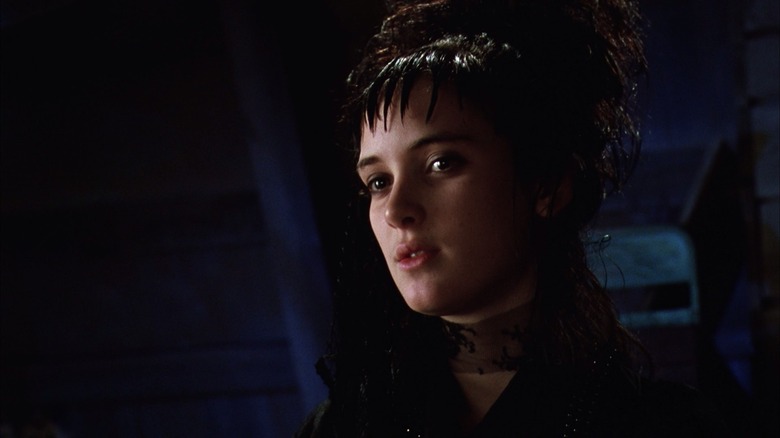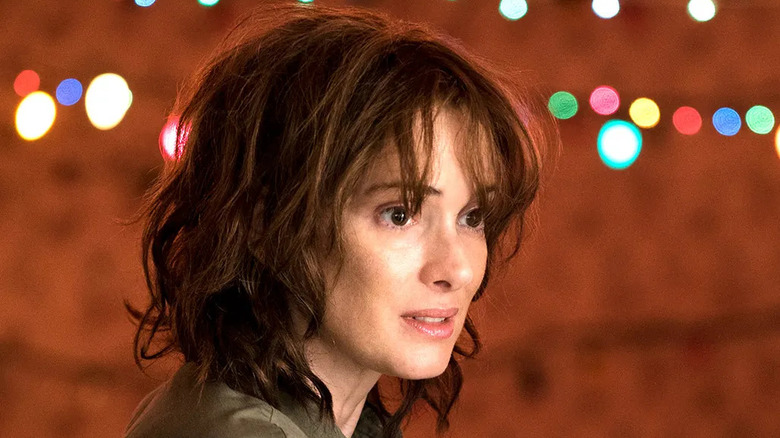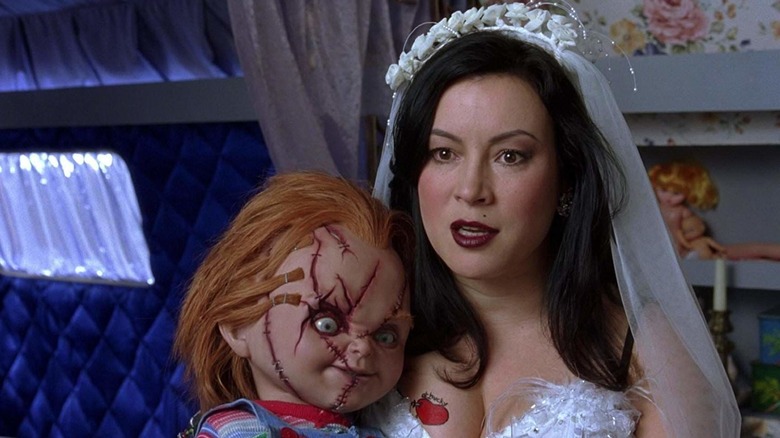How Beetlejuice Created An Unusual Situation For Stranger Things Season 4
In casting films and television shows that are set in the recent past, there exists a tacit understanding that the actors and characters are separate entities. For instance, "Once Upon a Time...in Hollywood" doesn't have to go out of its way to explain a resemblance between Kurt Russell's character of Randy and a kid named Kurt Russell starring in a little film called "The Computer Wore Tennis Shoes," which was released in 1969, the year "Hollywood" is set.
Yet when a movie or show involves characters who are not only pop-culture obsessed but whose actors became major movie stars via major blockbusters, that suspension of disbelief can be harder to ignore. That's the situation facing "Stranger Things" as it enters its fourth season: with the series having advanced to the mid-1980's, the world of the show is coming very close to the emergence of Winona Ryder (who portrays Joyce Byers) as a real-life movie star. While movies like "Lucas" and "Square Dance" could conceivably be skipped at the theaters by the Hawkins, Indiana gang, there's no way Mike, Eleven and the rest would miss out on 1988's "Beetlejuice," starring Ryder as Lydia Deetz.
"Stranger Things" creators Matt and Ross Duffer know this, and are trying their best to have the show avoid it.
A built-in end point for Stranger Things
As "Stranger Things" has continued, one question on viewers' minds is not just when the show itself will end (a question which has recently been answered), but in what time period the story will stop. After all, the series has positioned itself as being quintessentially about the 1980s, so a continuation or a time jump into the '90s would seem unlikely.
As it turns out, the Duffers have a natural end point built in: the release of "Beetlejuice." Speaking recently about the fourth season to Deadline, Matt Duffer explained that the existence of "Beetlejuice" is "the threshold we can't cross," because "once Winona is a superstar in the world, the show has to stop." Duffer can't conceive of what would happen if Joyce's children Will (Noah Schnapp) and Jonathan (Charlie Heaton) were to view the Tim Burton-directed, Michael Keaton-starring supernatural comedy, and see in it someone who looks exactly like their mother in a leading role — he laughingly suggests that perhaps their heads would "spontaneously combust or something."
Ross Duffer jokingly pitched an idea for end of the series based on that notion, explaining how "that's the final scene: the kids go to see 'Beetlejuice' and their heads explode." In any case, it's clear that "Stranger Things" will not attempt to either "re-cast" Lydia in "Beetlejuice," or go full meta with Ryder, choosing to avoid the subject altogether.
How Stranger Things could take a cue from another '80s-saturated franchise
Not to make life harder for the Duffers, but they have more than just "Beetlejuice" to worry about when it comes to blurring the line between fictions. bBy the looks of the season 4 trailer, Paul Reiser's Sam Owens will be playing a big role, and if the season is set sometime around 1986 as speculated, Reiser's appearance as the dastardly Carter Burke in "Aliens" will be on multiplex screens all over Hawkins that summer.
However, the Duffers need not worry so much about these "threshold" films encroaching on their series — all they need to do is follow the lead of the long-running "Child's Play/Chucky" franchise, which spans seven films and an ongoing TV show. Beginning with 2004's "Seed of Chucky," the franchise willfully acknowledged the "real" lives of the actors who appear in the series, having actress Jennifer Tilly (who first appeared in "Bride of Chucky" as the killer doll's old flame, Tiffany Valentine) appear as herself. The "Chucky" films and TV series never tries to explain away or change the fact that Tiffany Valentine and Jennifer Tilly look exactly alike, and instead embrace the resemblance.
Given that the "Child's Play" series is suffused with themes of voodoo, resurrection, and other forms of supernatural black magic, there's enough license to fudge believability there. Likewise, "Stranger Things" is filled with stuff like extra-dimensional warping, invasions and distortions of reality by otherworldly creatures, so why can't it follow suit? After all, there's precedent in its very title! Never mind the fact that Lydia states in "Beetlejuice," "I myself am strange and unusual." It seems like the "Stranger Things" kids could relate to such a statement, and wouldn't have their minds literally blown by seeing Winona on movie screens; such a reveal would likely just make them nod their heads and add it to the ever-growing pile of weirdness surrounding them.


